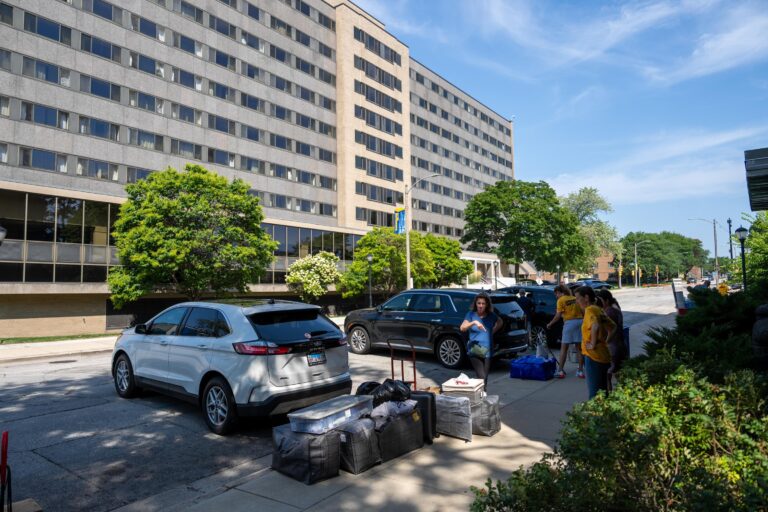The Office of Research and Sponsored Programs has announced the following grants awarded to university faculty and staff in September 2021:
- Marquette University receives graduate assistance grant for Department of Biological Sciences (Dr. Michael Schläppi, Dr. Lisa Petrella)
- Marquette University physical therapy professor receives $1.9 million NIH High-Risk, High-Reward Research grant(Dr. Jacob Capin)
Peripheral optogenetic restoration of motor function following spinal cord injury
$25,000 – The Morton Cure Paralysis Fund

Dr. Jordan Williams, assistant professor of biomedical engineering in the Opus College of Engineering
Abstract: This project seeks to demonstrate the utility of viral peripheral optogenetic stimulation in restoring motor function to paralyzed muscles following spinal cord injury. This approach has shown promise in stimulating motor function in healthy rodent and non-human primate models with advantages over electrical stimulation. This proposal aims to identify the time window after SCI during which this viral gene therapy and stimulation approach is viable in a rodent model, and develop hybrid optical-electrical stimulation techniques that may retain the advantages of optogenetic stimulation even under suboptimal viral gene therapy conditions.
Vascularization of critical-sized craniomaxillofacial defects
$362,630 – National Institutes of Health

Dr. Lobat Tayebi, associate professor in the School of Dentistry
Abstract: Lack of vascularization can lead to the failure, and ultimate death, of tissue in the treatment of critical-sized craniomaxillofacial defects. This project aims to examine a new on-chip approach, both in vitro and in vivo, in which precise amounts of an important angiogenic growth factor, VEGF, will be encapsulated in a way that it can be released controllably, sustainably and locally to facilitate the vascularization without the risky side effects.
Milwaukee Neighborhood News Service criminal justice reporter
$75,000 – Public Welfare Foundation

Ron Smith, editor and project director of the Milwaukee Neighborhood News Service in the Diederich College of Communication
Abstract: This award will fund a criminal justice reporter for the Milwaukee Neighborhood News Service, a nonprofit newsroom and project of the Diederich College of Communication at Marquette.
Mute Subjects: Nonverbal Communication in Eighteenth-Century British Literature
$20,000 – Newberry Library

Dr. Jason Farr, assistant professor of English in the Klingler College of Arts and Sciences
Abstract: This award allows for a four-month fellowship to research and work on a manuscript, “Mute Subjects: Nonverbal Communication in Eighteenth-Century British Literature.” Mute characters appear with regularity in fictional narratives, signaling philosophical debates about language and rationality while illuminating emergent medicalized views of the body and mind. Collectively, these works have surprising things to say about the construction of individual rights and personhood within the interwoven contexts of ableism, chattel slavery, patriarchy and settler colonialism. This project argues that eighteenth-century literature reimagines structural conditions in which dignity and humanity are ordinarily denied to the groups whom these characters are meant to represent.
Hubert Mäder Visiting Professorship: Bioethics and the Globe: Global Health, Suffering, Ethics, and the Voiceless
$50,000 – St. Louis University

Dr. Alexandre Martins, assistant professor of theological ethics in the Klingler College of Arts and Sciences
Abstract: The recipient has been awarded a visiting professorship at the Gnaegi Center at St. Louis University to focus on this last phase of his project on community participation in public health decision-making and human rights in Brazil. This phase consists in data analysis and writing manuscripts for publication. This publication will contribute to the field of bioethics and global health, as well as public health in Brazil from a human rights framework. Martins’ research has an interdisciplinary aspect addressing public health in Brazil and its relationship to social justice, considering the perspective of those who most need the public system, that is, the poor. Therefore, this research creates an interconnection between global health and social ethics, bringing concerns with justice in health care to the center of bioethics.
EPP Community of Scholars
Wheaton Franciscan Sisters Ministry Fund




Dr. Theresa Tobin (PI), associate professor of philosophy; Marisola Xhelili Ciaccio, doctoral candidate in philosophy and Carceral Studies Fellow with the Center for Urban Research, Teaching, and Outreach; Dr. Robert Smith, Harry G. John Professor of History and the director of CURTO; and Dr. Darren Wheelock, associate professor of social and cultural sciences, all in the Klingler College of Arts and Sciences
Abstract: With this funding, the Education Preparedness Program (EPP) seeks to establish a learning community for women returning from being incarcerated who are pursuing higher education. The learning community will enroll three justice-impacted women as a cohort in EPP courses from January 2022 through June 2023. EPP will provide them with funding for rent, living stipends, childcare support, as well as academic support and participation in restorative and wellness practices.
Opioid-induced dysregulation of lateral mesolimbic dopamine circuits and motivated behavior
$381,587 – National Institutes of Health

Dr. Matthew Hearing (PI), assistant professor; and Dr. Eden Anderson, research assistant professor, both of biomedical sciences in the College of Health Sciences
Abstract: Motivation for reward is common across all mammals and disruptions of motivated behavior has implications for vulnerability for several mental pathologies, including drug abuse disorders. This project focuses on physiological changes within specific brain circuits known to underlie motivated behavior and their causal relationship to disruptions in motivation that may confer relapse vulnerability. Specifically, experiments aim towards understanding how morphine dependence affects brain function and subsequently cause changes in motivation to obtain morphine over palatable food rewards.
Development of NMDA receptor subunits with alcohol insensitivity but unaltered physiology as molecular tools
$153,000 – National Institutes of Health


Dr. Robert Peoples (PI), professor; and Dr. Murray Blackmore, associate professor, both of biomedical sciences in the College of Health Sciences
Abstract: The effects of alcohol on human behavior are now considered to result from its actions on several specific brain proteins, including one of its major targets, the NMDA receptor. However, studies of the role of the NMDA receptor and its substituent subunits in the neurophysiological and behavioral effects of alcohol have been hampered by the lack of mutant NMDA receptor subunits that are insensitive to alcohol modulation but have otherwise normal physiology. The long-term goal of this project is to develop such NMDA receptor subunits for use in neurophysiological and behavioral studies, which could provide a basis for a better understanding of the precise role of the NMDA receptor in the effects of alcohol in the brain as well as in alcoholism.


